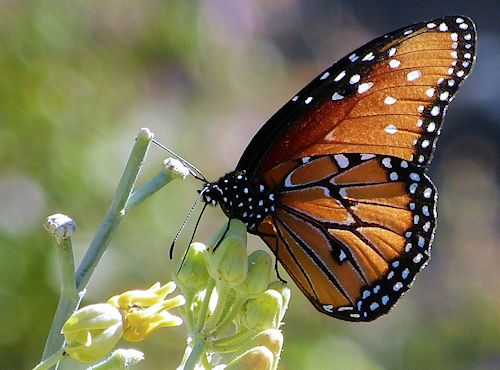Growing Asclepias subulata:
Desert Milkweed
Description
Form: Herbaceous stems growing from a woody base (subshrub).
Lifespan: Perennial.
Leaf retention: Deciduous.
Growth rate: Moderate.
Mature Size: 4' (1.2m) high and wide.
Flowers: Small flowers in clusters, dull yellow to white, not showy.
Bloom: Spring through fall.
Fruit: A seed pod that splits vertically to release seeds (follicle). The pods are tubular, tapered at both ends, initially blue to green, containing plumed seeds.
Leaves: Small, narrow leaves appear during rain and drop in drought.
Stems: Blue to green, photosynthesizing, long, narrow, upright to ascending.
Roots: This plant has a taproot.
Wildlife: The flowers attract butterflies, bees, and insects that feed on aphids. This plant is a caterpillar food plant for Queen and Monarch butterflies.
Toxic / Danger: All parts of this plant are toxic if ingested. The sap is skin irritant.
Origin: California, Nevada, Arizona and Mexico.
Form: Herbaceous stems growing from a woody base (subshrub).
Lifespan: Perennial.
Leaf retention: Deciduous.
Growth rate: Moderate.
Mature Size: 4' (1.2m) high and wide.
Flowers: Small flowers in clusters, dull yellow to white, not showy.
Bloom: Spring through fall.
Fruit: A seed pod that splits vertically to release seeds (follicle). The pods are tubular, tapered at both ends, initially blue to green, containing plumed seeds.
Leaves: Small, narrow leaves appear during rain and drop in drought.
Stems: Blue to green, photosynthesizing, long, narrow, upright to ascending.
Roots: This plant has a taproot.
Wildlife: The flowers attract butterflies, bees, and insects that feed on aphids. This plant is a caterpillar food plant for Queen and Monarch butterflies.
Toxic / Danger: All parts of this plant are toxic if ingested. The sap is skin irritant.
Origin: California, Nevada, Arizona and Mexico.
Cultivation and Uses
USDA hardiness zones: 9-11.
Heat tolerant: Yes.
Drought tolerant: Yes.
Sun: Full sun to part shade.
Soil: Well draining, low in organic material, pH 6.6-8.5 (neutral to alkaline). Do not fertilize.
Water once established: Monthly. Overwatering attracts aphids.
Prune: In winter, cut overgrown clumps to their base every 3-5 years to induce new growth.
Litter: Low.
Propagation: Seed.
Uses: Butterfly garden, low water (xeriscape) garden, butterfly caterpillar nursery.
USDA hardiness zones: 9-11.
Heat tolerant: Yes.
Drought tolerant: Yes.
Sun: Full sun to part shade.
Soil: Well draining, low in organic material, pH 6.6-8.5 (neutral to alkaline). Do not fertilize.
Water once established: Monthly. Overwatering attracts aphids.
Prune: In winter, cut overgrown clumps to their base every 3-5 years to induce new growth.
Litter: Low.
Propagation: Seed.
Uses: Butterfly garden, low water (xeriscape) garden, butterfly caterpillar nursery.
Comments
This plant is a member of the Dogbane family (Apocynaceae). Another common name is Rush Milkweed. This is a long blooming plant. The blue to green stems provide a bit of color all year.
The best way to keep this plant from flowering is to fertilize it, or water it more than once every two weeks. Being a desert plant, it should be in poor, unamended soil, and never fertilized. The soil should be very well draining, and seldom watered, because this plant can suffer from root rot in wet soil.
Do you have additional information or a different experience for these plants that you would like to share? Email info@GardenOracle.com. All contributions are welcome and appreciated.
This plant is a member of the Dogbane family (Apocynaceae). Another common name is Rush Milkweed. This is a long blooming plant. The blue to green stems provide a bit of color all year.
The best way to keep this plant from flowering is to fertilize it, or water it more than once every two weeks. Being a desert plant, it should be in poor, unamended soil, and never fertilized. The soil should be very well draining, and seldom watered, because this plant can suffer from root rot in wet soil.
Do you have additional information or a different experience for these plants that you would like to share? Email info@GardenOracle.com. All contributions are welcome and appreciated.




Latest update: October, 2024
© 2008-2026 by GardenOracle.com

